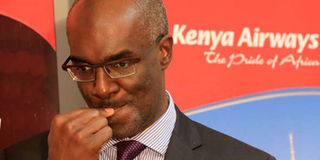Lack of cargo policy hurts national carrier

Kenya Airways CEO Mbuvi Ngunze during the announcing of the firm's financial report in Nairobi on July 21, 2016. Curiously, the Kenya Airways management were not authorised to make any major strategic decisions without the approval of KLM appointed officials. PHOTO | JEFF ANGOTE | NATION MEDIA GROUP
What you need to know:
- In the arrangement, the government retained a 23 per cent stake while local and foreign investors owned 51 per cent.
The government sold 26 per cent of its stake to the Dutch national carrier, KLM, in what was thought to be a skewed arrangement.
Initially, the shareholders were not only unhappy with the performance of the stock, but openly argued that some of the clauses that the government had signed were akin to giving away the national airline to KLM for a song.
In the arrangement, the government retained a 23 per cent stake while local and foreign investors owned 51 per cent.
According to the agreement, however, KLM got powers to appoint both the managing and the finance directors. It also got powers to appoint some board directors.
Curiously, the Kenya Airways management were not authorised to make any major strategic decisions without the approval of KLM appointed officials.
Some of these included acquisition of new aircraft and changes in the route network.
Although KQ would later turn profitable, before the numbers nose-dived again, shareholders who turned up at the first AGM were angry about the airline’s Sh1 billion bad and doubtful debt owed mainly by parastatals.
At the time, KQ had also taken a syndicated loan from France and the UK and shareholders felt that the 11.5 to 13.12 per cent interest for the French loan and the 12 per cent to 13.62 per cent for the UK one were too high.
They demanded that lower rates be negotiated. Some of these loans had been negotiated in the 1980s when interest rates were too high and Kenya Airways had failed to re-negotiate them.
While these were some of the initial teething problems that faced KQ, they gave KLM more say in the airline because KQ was faltering and nearing collapse.
From the start, the government also failed to reserve cargo rights to KQ, leaving it to compete with other airlines.
“I think this was a mistake. We did not reserve rights of cargo to KQ as a national policy,” Mr Mbuvi Ngunze, the airlines CEO, said in a recent interview with the Nation.
“Other countries that have grown their airlines into profits reserve these rights to the national carriers.”
Cargo accounts for only 10 per cent of KQ’s revenue.





